This article has links to products and services we love, which we may make commission from.
Why the sudden switch from tanning on beaches to cleaning up beaches, Gemma? Good question! Recently, Scotland’s top content creators grouped together to take part in the first cross-network (bloggers, vloggers, IGers) campaign, #shoreyoucare, and it is making waves. Since the educational event and beach clean, I’ve spent the last month researching the best zero waste products used in everyday life from bags to brushes.
This guide will detail how to go plastic-free, reducing our single-use plastic purchases by switching to more environmentally friendly products. This is not a preachy post, going completely plastic-free is impossible and I will highlight the problems caused by businesses and government but the #shoreyoucare event has opened my eyes and hopefully, this article will show you a few changes you can make too.
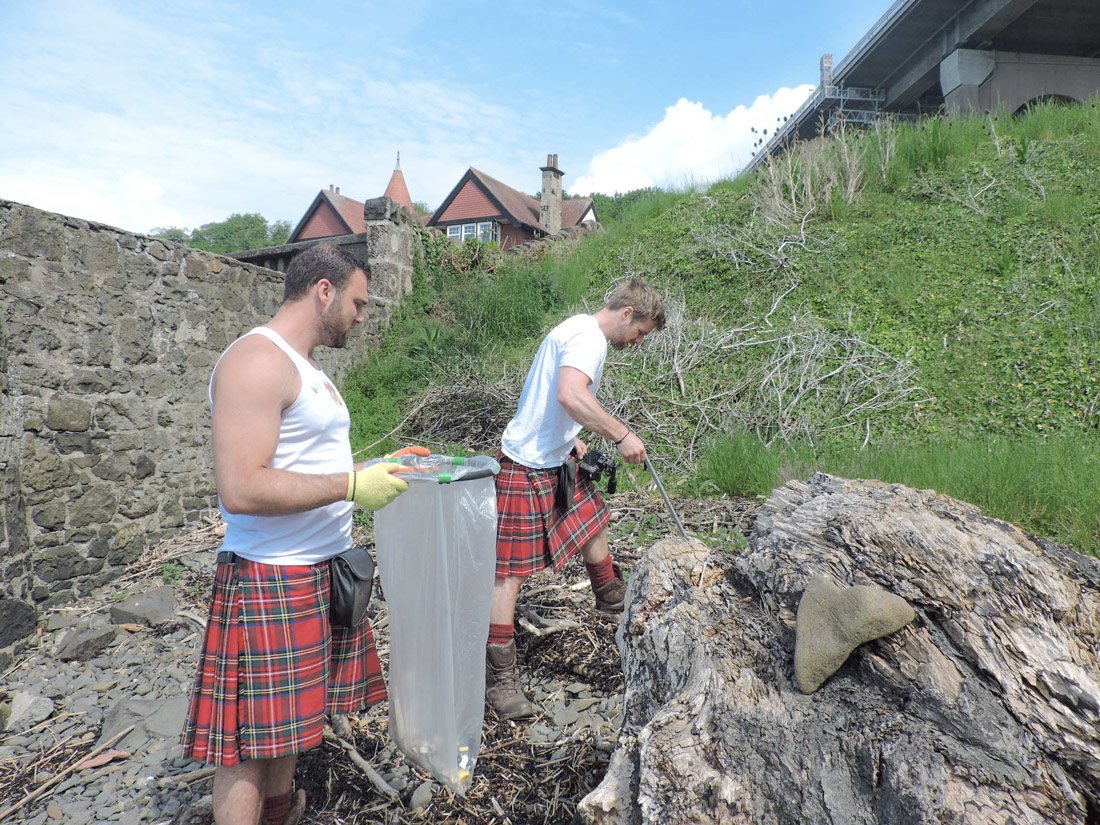
Rab and Stephen, The Kilted Coaches, getting their hands dirty (in style)
Use of Plastic in Daily Lives
From breakfast through to bedtime we are accustomed to using plastic in our daily lives.
Small changes can make a big difference and the biggest focus is on avoiding single-use plastic products.
The key is being organised and prepared. Admittedly, any attempt to go plastic-free in the past was down to me selfishly benefiting from cheaper products or spill-free travel.
This July I pledge to attempt to use more green products and will share my success (or lack of it) on our social media channels (Facebook, Twitter, Instagram).
Here are some ideas for switching from plastic to plastic-free products.
Zero Waste Products
Disclaimer: I am part of the ‘progress, not perfection’ clan. I do understand that there will be readers who are militant and I applaud you but negative comments are not helpful – patience is key.
This is an organic (boom boom) process, a lifestyle change which takes time and mistakes. I am in no way advising readers to throw out all of their plastic on June 30th! Just consider the small changes as your plastic items run out/come to end of life.
Kitchen/Food + Drink on the Go
There are a few easy switches you can make in the kitchen, starting with food/drink storage.
Eco water bottles such as the popular and very attractive Chilly’s (UK only) or chunkier but practical Tree Tribe US / UK keep cold water cool and hot liquids hot.
After a night of research, I decided to go for the Tree Tribe bottle because I like the hook for attaching to my bag when hiking.
I’m happy to report that there was no plastic packaging. These reusable water bottles cut down single-use plastic bottles, you just have to remember to fill them up and take them with you. For glasses, we’ve always used old pasta/jam jars (to my Dad’s annoyance!)
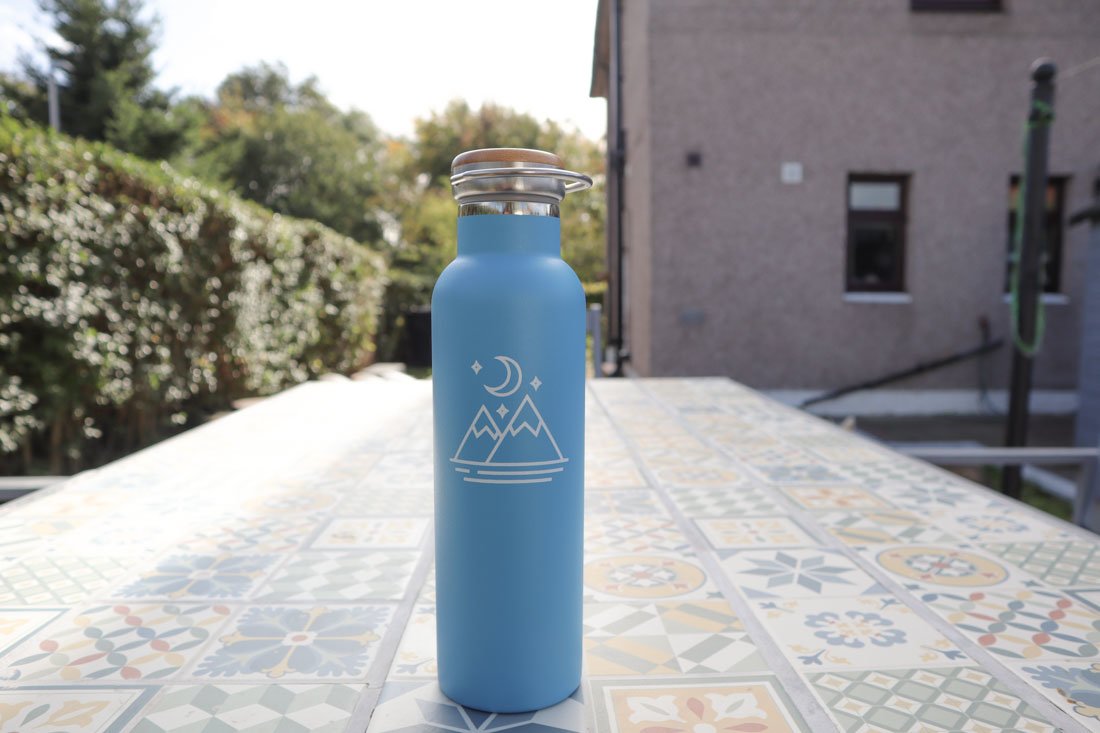
Coffee drinkers, please put down the disposable cup!
The majority of paper cups are not recyclable (unless they use Vegware or similar) but there are alternatives on the market, again it’s about being prepared.
KeepCup US / UK are currently on-trend but the lid is made of plastic while the cup is glass.
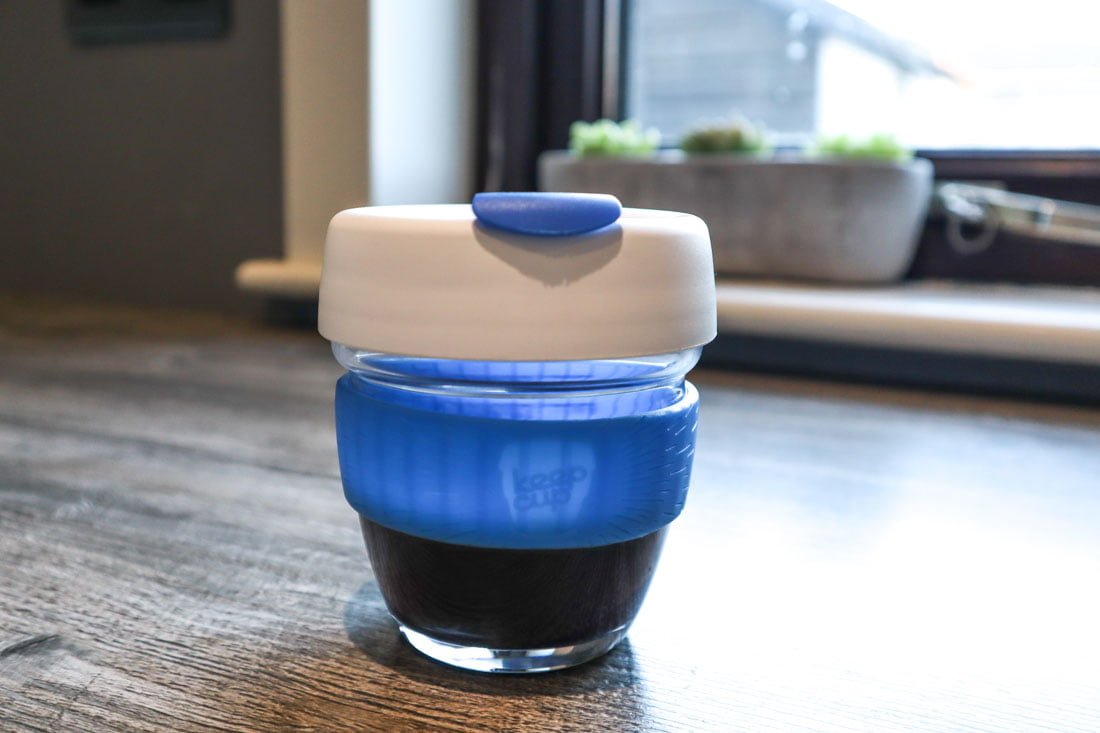
Thanks to a local zero waste Facebook group, I’ve sourced a local milk delivery who uses glass bottles and charge 85p for one.
Unfortunately, they don’t do yoghurt, we go through two cartons a week.
I’m just back from a hen weekend in Liverpool and the number of plastic straws was ridiculous – we’re talking two straws to one glass.
The solution?
Bring your own bamboo cutlery set US / UK which come with a cleaning brush. Annoyingly, people keep stealing them on nights out.
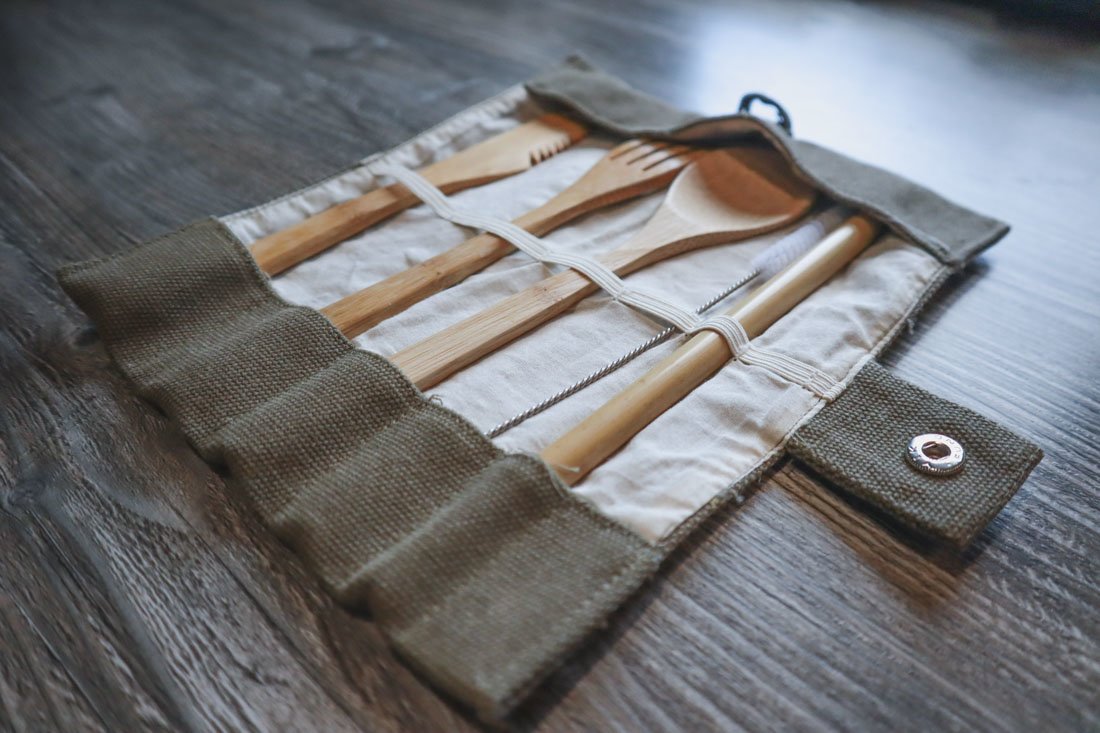
We are very guilty of using too much tin foil and single-use sandwich bags but that’s about to change now we have collapsible Tupperware boxes US / UK.
These babies flatten down so you can carry in your bag, took them to Liverpool on the hen weekend, brilliant!)
Other like beeswax wrap for pulling over tubs.
A cheaper alternative than wraps would be glass bottle storage. Not just for the hipsters!
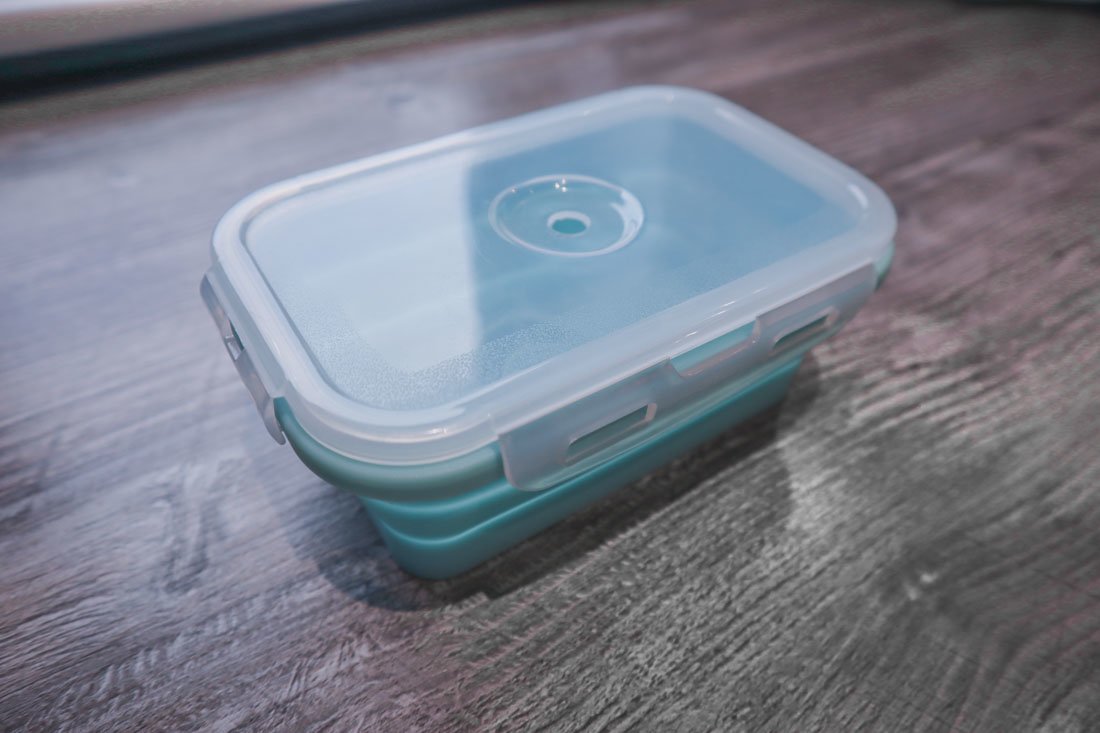
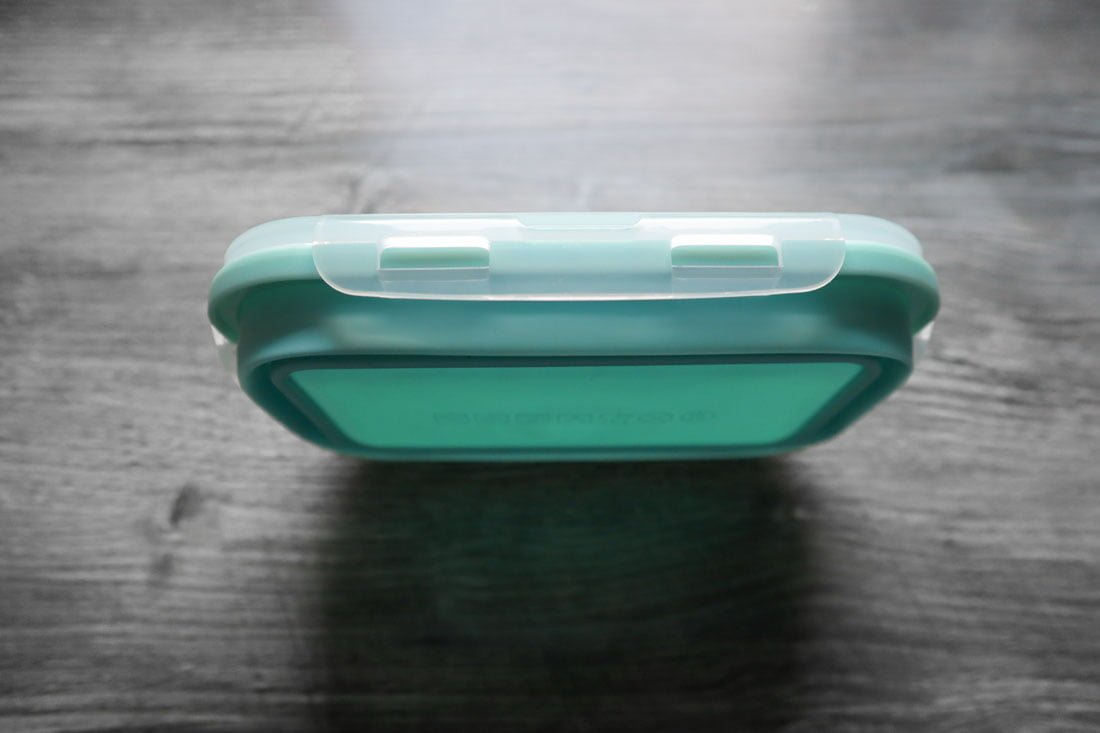
Now for under the kitchen sink. My Gran has always said that vinegar can be used for a variety of everyday activities and it is a family tradition to use white vinegar to clean windows.
This vinegar can also be used for cleaning floors and worktops too. Another bonus is that it nasty chemical-free. I add a lemon drop of lemon oil to take away the strong chip shop smell.
Finding vinegar that comes in a glass bottle has been a challenge!
Aldi advised me they recently switched from glass to plastic.
Soda bicarbonate with water is another alternative for cleaning kitchens, bathrooms, and clogged sinks.
After months of persevering with bicarbonate, I have reverted back to Cif for cleaning bathrooms.
Craig and I volunteered at a hostel on Canada’s Sunshine Coast and the main material for laundry cleaning was soap nuts which are placed in a bag and put in with the washing.
I’ve now tried this at home and I’m not a fan so we’re back on boxed detergent.
Bathroom/Toiletries Eco-Products
Those following the #shoreyoucare event will know that cotton buds were found in our plastic tide. Follow in many of the UK supermarkets footsteps by opting for alternatives like non-plastic.
They actually say you shouldn’t put anything bigger than your elbow in your ear but I love cleaning my ears, it’s therapeutic! It freaks Craig out about how much I enjoy it.
I’ve invested in Truthpaste after reading rave reviews. It was expensive in comparison to a tube of Colgate but it is made of natural ingredients and lasts for two months apparently.
Update, I didn’t love it. I’ve since tried other ranges and have settled on alternating tooth tabs and tubes of toothpaste.
I now use a toothbrush with a biodegradable bamboo-based handle and charcoal brushes US / UK.
Finding floss was a bit of a challenge but settled on Georganics US / UK – at five times the price of plastic floss.
All of these products were boxed, no plastic used by the original company.
Update, absolutely love it, worth every penny.
I’ve always used Lush’s solid shampoo and conditioner for travelling as it means no spills. It comes in a tin but there’s an issue if you are travelling each day as there is no time for the shampoo bar to dry out and remain solid.
Lush isn’t local to me either which is an issue as I’m rarely in the city for shopping. Militants don’t recommend the company because of their use of ‘safe sulphates’.
Another downside of Lush is that I struggle to use their fresh products by the sell-by date (for face masks and cleansers) but their tubs are recyclable and you get a free face mask when you return five.
I do really like their products.
Moving forward, I am happy to make the change to using solid shampoo and conditioner full time, I just need to find a more accessible option like this award-winning 5-in-1 for replacing in-between city trips. We’re ditching our regular liquid body washes for soap.
Deodorant! Quite an unusual change to go from a roll-on stick to a product you scoop out of a tin but my new friend Bex is a big fan so I’m going to give it a try. Alternatively, check out the stick variations on Etsy.
From the age of 19, I’ve suffered from painful acne on my chin, really sore boil-like spots that rarely come to head (I’ve been on Roaccutane three times).
I’ve been acne-free for a year now and I’m not sure if it is age or the fact I switched from using liquid face cleaners to cleanser melts (by Lush) which you remove with a cloth (plastic-free).
For those who use make-up remover, consider this plastic-free option – replace cotton wool/pads (which come in plastic) with material ones. You can buy them on Etsy or make your own. Also good for removing nail varnish.
TOTM, I was horrified to see plastic tampon containers amongst the seaweed on North Queensferry beach and have always been curious about menstrual cups so it is time to ditch the pads.
The most popular menstrual cup on the market is the Diva Cup which comes in different sizes. To insert you, sit relaxed on the toilet, flatten the cup and fold in half creating a ‘C’ shape then place inside using your thumb and index finger. The cup should then unfold. You can use the cup for up to 8 hours.
To remove, pinch the bottom and pull the stem which hangs outside. Dispose of the blood down the toilet, rinse and reinsert. To keep clean, at the end of your period wash in unscented soapy water.
To sanitise you can boil the cup in water but avoid it touching any sides as it will lose shape. The cup is made from silicone which is durable, while the lifespan recommendation is around one year.
Let’s do the maths – tampons at around $3/£2.27 nine times per year, $27/£21 (ish – you probably don’t use a full pack of tampons per period though) which works out around the same price as the menstrual cup but no waste and it lasts longer than one year!
New on the scene, period pants. Feel a little heavier than a pair of pants but soak up any liquid so you are not sitting a wet nappy. Highly recommend, Period pants.
I’ve got the ‘pretty’ ones but my friend prefers the ‘sassy’
Finally, toilet roll and this is the one product I am probably not going to going plastic-free for at this time.
Seventh Generation is one of the biggest players on the market for recycled toilet paper but the reviews are inconsistent – too thin and expensive. Similar reviews are said about Who Gives A Crap (UK) but I do like their marketing!
My Progress
[table id=3 /]
Plastic Challenge
This is a lifestyle choice for me but the idea started when I heard about the Go Plastic Free campaign.
This campaign is similar to the campaign by the Marine Conservation Society (Plastic Challenge #GOplasticfree) who delivered a workshop during the #shoreyoucare campaign at the Doubletree Hilton at North Queensferry. Catherine, the presenter, had a real infectious personality.
Not only did the presentation and activities change my outlook on life (wet, I know, sorry) but also my focus for Two Scots Abroad. I’ve been discussing plastic use and your support on our social media channels (predominately during Trash Talk Tuesdays on Instagram Stories) shows you care too.
So what’s next? This July you can pledge to go plastic-free too. It will be hard, it is a challenge after all, but by doing so we’re not only reducing our single-use plastic usage but also raising awareness and saying yes to zero waste!
What To Do Next
- Join the Plastic Free Campaign – sign up here (it’s free, you get information)
- Look out for free zero waste Facebook groups in your area for support
- Follow our Trash Talk Tuesdays on Instagram Stories for my progress
- Switch single-use plastic for more sustainable options (see table above)
- Carry a cloth bag with you
- Order milk in glass bottles with a return scheme
- Explain to others why you are saying no to plastic – people love it!
- Watch Erin Beauty Creep and The Kilted Coaches videos of our beach clean
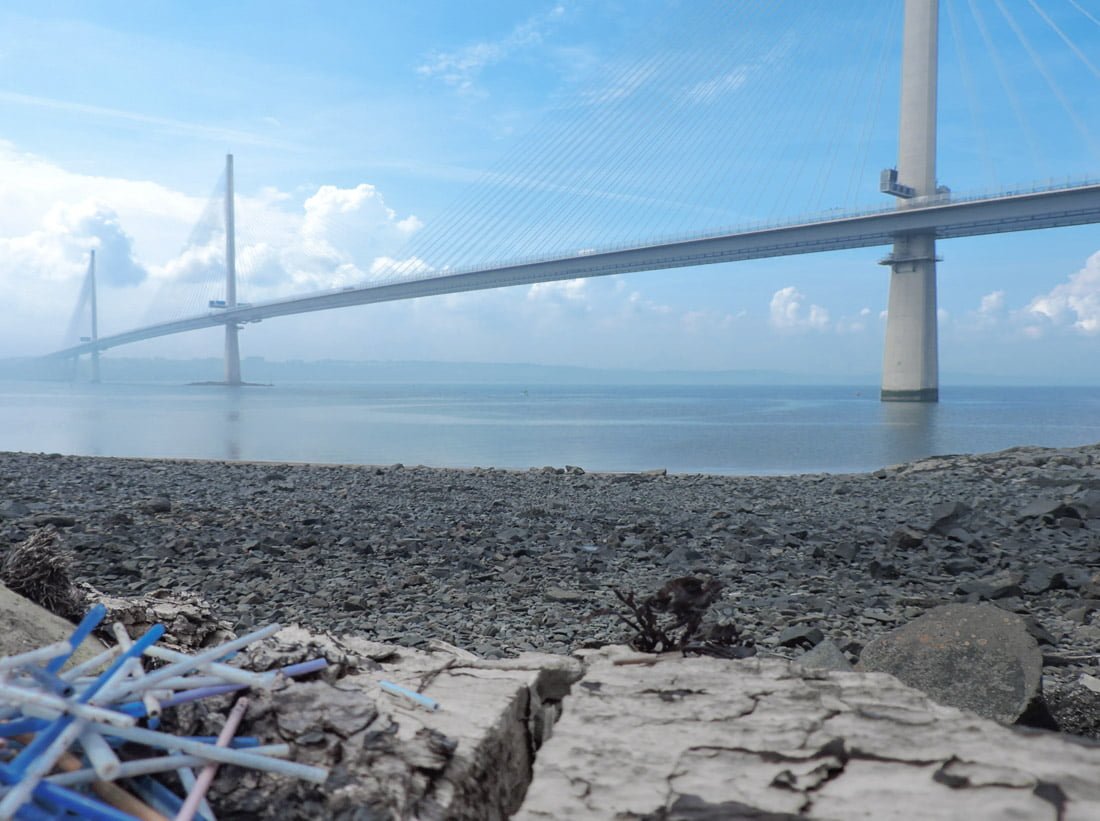
Why is plastic bad for the environment?
It’s estimated that over 300 billion pieces of plastic are ruining the Arctic Ocean, some of which will lasts forever.
I know we are all doing our bit by putting plastic in the correctly coloured bin but still, thousands of marine life die every day because they think our junk is their meal.
We’ve all seen the video of the whale that died from eating 80 plastic bags eh? Watch below if not.
Plastic doesn’t biodegrade, it just gets smaller and smaller. Companies that work with plastic often use plastic pellets called nurdles.
These nurdles end up in our oceans at the ports or during shipment. Nurdles were the biggest offender during our beach clean.
As you can see from our survey findings below, plastic/polystyrene made up over three-quarters of our find.
Alasdair Neilson from the local marine charity, Fidra, highlighted the issue of nurdles during our talks.
Fidra is also known as the nurdle hunters and wants to know if there are nurdles near you. You can join them in their hunt through the Operation Clean Sweep.
What’re the issues with nurdles? Animals think they’re food, 95% of dead gulls, terns and fulmars studied in the North Sea had traces of nurdles in their stomachs.
The event ended with a boat tour with Forth Tours where we spotted seals and puffins, it really put into perspective what will be lost.
Our oceans have no boundaries, this plastic pollution impacts all of us. Jokes aside about a message in a bottle but a bottle dumped in Canada can make its way to Cornwall!
On a positive note, kudos to the UK Government for banning microbeads in cosmetics. Still, a long way to go though.
We had the pleasure of listening to Robbie from Fife’s Coast and Country Trust (my local area) who was baffled at the number of sanitary products and condoms flushed down the toilet.
The findings of our beach clean confirmed this annoyance with just under one-quarter of the survey being sanitary waste.
Robbie asked why do schools not discuss the safe disposal of these products when they educate young people on how to use them?
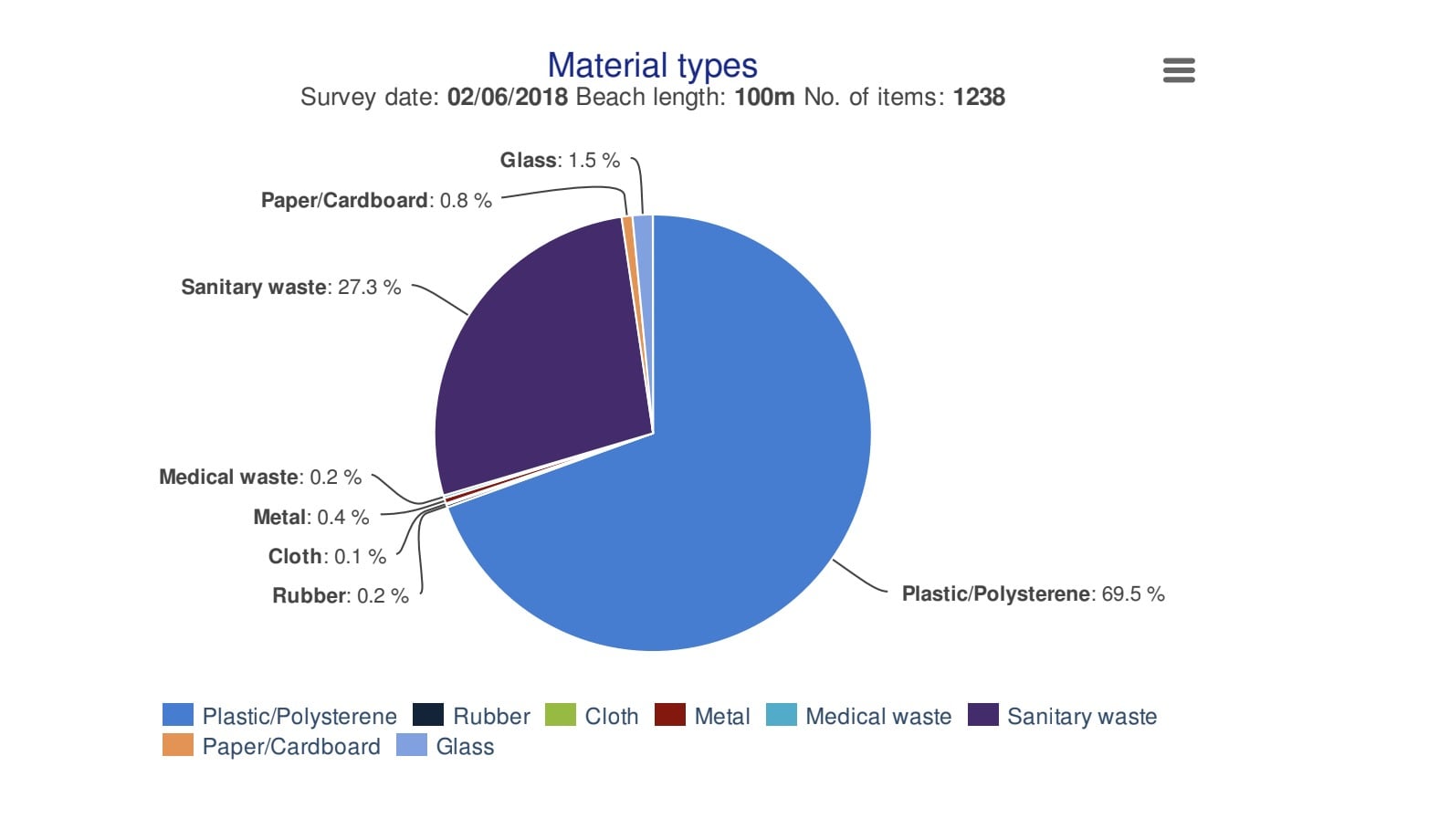
The challenge with the plastic-free challenge
We are not denying that big businesses are cock-blocking us in our fight against single-use plastic.
Those who have been following my Trash Talk Tuesdays on Instagram Stories will know that supermarkets have a lot to answer for – unnecessary plastic packaging around fruit and vegetables (they have natural packaging in the form of skin), surprise plastic packaging on goods which are already packed in boxes and plastic bags.
In Scotland and England in an attempt to avoid plastic bags, the Scottish Government put a ban on free bags so we pay 5p+.
I distinctly remember food shopping at Willie Lows in the 80s and we packed our food in boxes which were free to use at the side of the checkout.
♥ The solution? Remove plastic packaging at the supermarket, let them deal with the recycling and send a message that we don’t need it. I’ve only done this once in a bigger supermarket, felt too awkward in the wee Co-op up the road.
> Our local supermarkets (Asda and Tesco in Dunfermline) won’t let us use our own Tupperware for meat and fish.
♥ The solution? Is there a community or farmers market near you? Or a delivery van or butchers/fish shop? Ask in your local zero waste Facebook group.
> It can be expensive. Dental floss that was once £1 is now £10, getting fruit delivered for one is not an option at £14 and a trip to Lush costs me a train ride plus the product.
♥ The solution? Prioritise what you can do. One member of the Zero Waste FB group said it is progress, not perfection. Can you get creative and make alternatives yourself? Old tops for make-up removal pads maybe?
> Our local fruit shop is in the town of Dunfermline, 10 minutes’ drive from our home and there is no free parking near the fruit shop. Alternatively, I have to drive 25 minutes to my childhood town of Burntisland for free parking. This (or walking) is not realistic for busy families who work full time. We are lucky to have two bakers and one butcher in our small hometown that we buy from often. Annoyingly single rolls are packed in single-use bags yet pastries come in paper bags in one baker.
♥ The solution? Prioritise as mentioned above and tell the shops why you don’t want plastic bags, dialogue makes change. I’ve not had any negative response from shop owners so far.
So What are Sustainable Products?
Sustainable products consider the resources that they are made from and the process by which they are made. Although there is a shift towards wood and paper-based products in the go plastic movement, sustainable literature would point to how wood fibre is recycled.
The use of hazardous substance elements is also a focus of sustainable product analysis.
Its life cycle impact on global climate change and renewable energy may also be addressed. Socio-economic issues from design to end of life also impact on the sustainability of the product. Consider, in an attempt to go plastic-free is it worth purchasing products that have been shipped from another country taking its carbon footprint on-board? I know this is a discussion amongst the environmentalists in the vegan community. Buy less, experience more!
Conclusion
The quest to create a plastic-free environment in our homes is going to be a tough one but focusing on the reduction of single-use plastic is a great starting point.
We are often guilty of wearing rose-tinted glasses when we look to the past but frequent discussions have highlighted that paper bags were the norm, families shopped at their local grocers on high streets and the lack of disposable income benefited the environment because water was poured from the tap and not £1 plastic bottles.
Going plastic-free not only protects our marine life but also supports local businesses! I hope that you have found our guide to eco-friendly products used in every day more useful than a single-use plastic bag.
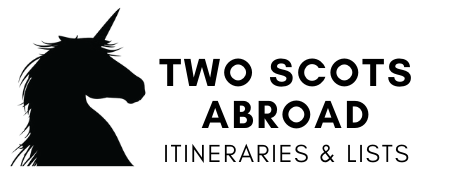
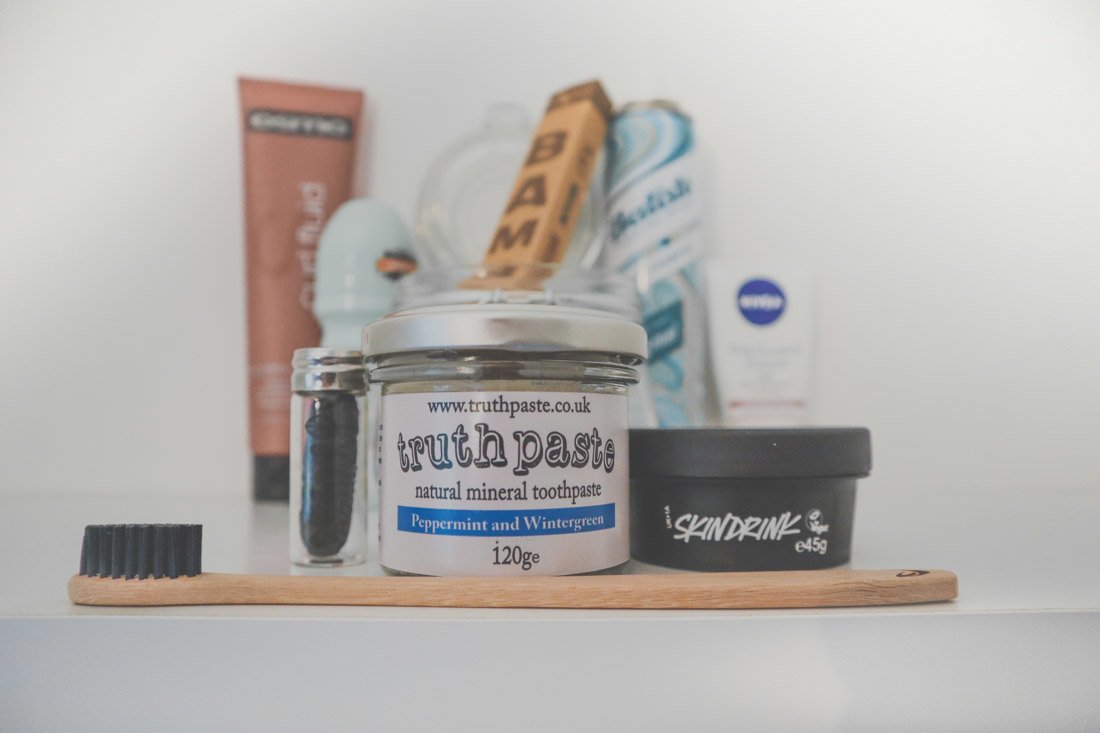
I am not sure if this site is even live anymore – but I wanted to say thank you for this blog. I am from the US and unfortunately there are not very many regulations to force systemic change. So I try to do what I can – but often get overwhelmed. I liked you disclaimer about ‘progress, not perfection’. I know for me I have to start small and develop that habit in order to maintain any changes I wish to make. Thank you again.
Hi Dawn! Thank you for taking the time to leave a message. The site is still very much alive and I’m still trying to progress with zero waste. It’s been a lot harder during the pandemic! Good luck on your journey. ~ Gemma